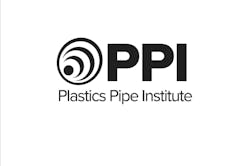PPI Re-ups Sponsorship for DOE's Solar Decathlon
IRVING, TX - The Plastics Pipe Institute, Inc. (PPI) has renewed its commitment for financial and technical support as an educational sponsor for the 2021 U.S. Department of Energy (DOE) Solar Decathlon® Design Challenge. PPI is the major North American trade association representing the plastic pipe industry. This is PPI’s seventh year supporting this DOE program, formerly known as Race to Zero. Resources developed by the association to help students design their projects are available at https://plasticpipe.org/building-construction/bcd-2021-solar-decathlon.html
The Solar Decathlon Design Challenge is a collegiate competition, comprising 10 contests, that challenges student teams to design highly efficient and innovative buildings powered by renewable energy. The 2021 event includes seven building divisions, including attached housing, suburban single-family housing, and elementary school. Normally held at DOE's National Renewable Energy Laboratory (NREL) in Colorado, the 2021 Solar Decathlon Design Challenge event will take place virtually on April 15-18, 2021. Lance MacNevin, P.Eng., director of engineering for PPI’s Building & Construction Division, will return as a juror.
According to MacNevin, “PPI encourages design teams to incorporate innovative plumbing and mechanical systems to improve the health, safety, and welfare of building occupants and the efficiency of buildings. This includes technologies such as hydronic radiant heating and cooling, ground source geothermal, hot- and cold-water plumbing using plastic piping solutions, and fire protection for occupant safety. These systems can support designs in practically all 10 contests, including energy performance, engineering, embodied environmental impact, occupant experience, comfort & environmental quality, and architecture.”
In 2020, the winning entry of the Urban Single-Family Division from the University of British Columbia (Vancouver, BC), known as “Solis House”, incorporated ground source geothermal and radiant heating/cooling distribution to deliver occupant comfort with 100% electrification. The team’s submission stated that “Radiant heating profiles closely align with ideal temperature profiles” and “Hydronic heating and cooling requires smaller temperature operating ranges, which reduces loads and allows the heat to operate at higher efficiencies.”
According to the event’s website, “Qualifying teams complete a design project and attend the Solar Decathlon Design Challenge Weekend, where they present their designs to a panel of industry expert jurors, compare their projects to those of other teams, learn from presentations by thought leaders and collegiate peers and engage with a variety of organizations about energy careers. Winning project presentations are published on the website.” https://www.solardecathlon.gov/event/challenges-design.html
New for 2021, the first-ever Solar Decathlon Build Challenge Virtual Village will be “located” on the National Mall, where the first Solar Decathlon event was launched in 2002. The village opened to the public on April 12, 2021.
PPI President David Fink said, “Buildings in the United States represent 40 percent of our country’s total energy consumption and 70 percent of our electricity use, and there are many opportunities to utilize sustainable piping technologies in smart ways to reduce energy costs. PPI supports these events because we see future architects and engineers collaborate and compete to design buildings that are so energy efficient that their annual energy use can be offset with on-site renewable energy. Piping products such as those developed by PPI members help many of the teams to reach these goals.”
Added MacNevin, “It’s always inspiring to see such innovative designs from student teams from around the world. We can’t wait to see what they’ll present at this year’s event!”
For additional information, also visit the Plastics Pipe Institute's website at: www.plasticpipe.org.
